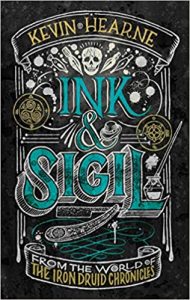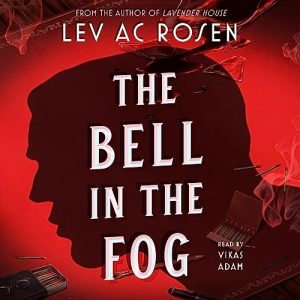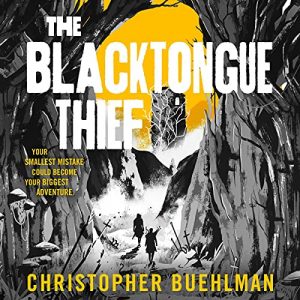 Constituent Service: A Third District Story by John Scalzi
Constituent Service: A Third District Story by John Scalzi Narrator: Amber Benson
Format: audiobook
Source: purchased from Audible
Formats available: audiobook
Genres: humorous science fiction, science fiction
Length: 2 hours and 30 minutes
Published by Audible Studios on October 3, 2024
Purchasing Info: Author's Website, Publisher's Website, Amazon
Goodreads
The aliens are here . . . and they want municipal services!
Ashley Perrin is fresh out of college and starting a job as a community liaison for the Third District—the city’s only sector with more alien residents than humans. Ashley’s barely found where the paper clips are kept when she’s beset with constituent complaints–from too much noise at the Annual Lupidian Celebration Parade to a trip-and-fall chicken to a very particular type of alien hornet that threatens the very city itself.
And if that’s not terrifying enough, Ashley is next up at the office karaoke night.
It's Parks and Recreation meets the Federation of Planets in this fast and funny audio exclusive by Hugo Award winner and Audible best seller John Scalzi.
My Review:
Constituent Service is a story about going the extra SEVERAL miles in order to do a great job – while being chased by KILLER HORNETS every step of the way.
But it doesn’t start there. It starts with Ashley Perrin’s first day on the job as the Third District Council Office’s latest community liaison. Ashley’s first day, first week, first month, first everything is just a bit more interesting than most people’s early work experience, which can absolutely be put down to the circumstances in which the job exists – as well as a lot to Ashley’s own personality – rather than to the parameters of the job itself.
Because this is a near-future Earth, and we (humans) KNOW we’re not alone. Not in the galaxy, and certainly not on this planet.
To be fair, most of Earth’s population still seems to be human, just as other planets where humans have gone are still mostly made up of their own native populations. Many intelligent species are quite adaptable, but not every planet’s environment conditions are survivable by every species, so this makes complete sense – or at least as much sense as some of this author’s wilder stories ever manage to do.
The Third District is different because it’s one of the few human-minority districts in the (unnamed) city. 90% of the district’s population is made up of a myriad of non-human species – a fact which is absolutely represented by the staff of the Third District Council Member’s constituent office.
That the Council Member managed to get his human self elected to the office in a district where his species is definitely in the minority is frequently remarked upon. That Ashley is only the second human to ever serve as the community liaison for the Third District office is also noteworthy. That previous human lasted less than a week – a record that Ashley is determined to beat – and certainly does.
The story in Constituent Service is the story of Ashley getting thrown into the deep end of the wild, weird and wacky work of constituent service in an office and a world where she has to sink or swim in a pool of utterly alien but marvelously supportive colleagues. While at the same time absolutely going over and above the line of duty to solve the surprisingly and potentially earth-shattering mystery of exactly what is bollixing up the sewer system under the district – and is on the verge of exploding. Explosively. With murder hornets.
Escape Rating A-: I absolutely did escape to the Third District, to the point where I wasn’t ready to come back at the end. In spite of the murder hornets, but because of Ashley’s horrifying but original solution to THAT problem – as well as the many, many other issues she faces during her first months on the job.
Even if Ashley and her colleagues never do manage to get back to karaoke. Or maybe because of THAT too, or just the idea that her alien colleagues have bonded over such a thing.
The story works, and works marvelously well, because it’s told entirely from Ashley’s first person perspective. We’re inside her head and it’s a fascinating – and really quirky – place to be. It also works because this mostly alien situation is totally grounded in the real and remains so, no matter how weird things get. Any reader who gets into Ashley’s humor and perspective and can do even its weird attitude is going to enjoy this book a LOT. (I certainly did!)
Because it’s not really about the aliens – not that they aren’t a marvelous feature. It’s really about the trials and tribulations and wacky humor and terrible jokes of being in any sort of customer service position dealing with supposedly sentient and sapient beings when they are in the midst of being pissed off about something they think someone else is supposed to fix.
It’s easy to drop into the situation right beside Ashley because her colleagues are wonderful, but also because the setup feels like something straight out of Alien Nation or Men in Black. If aliens did live openly among us, the reader can’t help but think that it would be just like this – right down to the importation of illegal pets, noise complaints about parades, and sewer problems bubbling up at the worst possible times.
That it also turns out to be a gigantic, not quite as alien as one might think, riff on the children’s book Everybody Poops! is, well, fun, stinky, scatological humor on an epic scale that is guaranteed to make the reader laugh out loud at just how shitty the whole situation turns out to be.
And now for the small bits of merde that kept this from being an A or A+ listen. They’re really small bits, think of them as, well, cling-ons. Or Klingons, as the case might be as the humor does descend to that level just often enough.
The subtitle labels Constituent Service as “A Third District Story”, implying that there are or will be others. Wherever they are, I want them. I at least want to know what and where they are if they already exist. Really, really badly because this was a ton of fun.
Second, and I recognize this is a me thing, because this is an Audible exclusive it will be audio only for a while until that exclusivity period runs out. It means that there’s no text. While on the one hand I absolutely believe that Amber Benson’s excellent narration will always be the better option for getting into this story considering it’s first person perspective, on the other hand, in the process of writing this review I would just about kill – or at least set a few murder hornets on someone – to get a cheat sheet of the dramatis personae and how the hell all their names are spelled. I’ve stuck to referring to Ashley because she’s the only name mentioned in the blurb so I know I’m spelling it right.
 Last but not least, Constituent Service is very much in the vein of the author’s recent books, The Kaiju Preservation Society, Starter Villain, and the upcoming When the Moon Hits Your Eye, in that it’s a story where very weird things, huge ‘what if?’ scenarios, are happening to perfectly ordinary people and the extraordinary is treated, not just with off-the-wall humor, but as if it’s all in a day’s work and the story just runs with it without ever remarking on the weirdness of the weird bits AT ALL. I love those sorts of stories. Readers who love this author’s work generally do. But if it’s not your cuppa, or if he’s not your cuppa, this probably won’t be either.
Last but not least, Constituent Service is very much in the vein of the author’s recent books, The Kaiju Preservation Society, Starter Villain, and the upcoming When the Moon Hits Your Eye, in that it’s a story where very weird things, huge ‘what if?’ scenarios, are happening to perfectly ordinary people and the extraordinary is treated, not just with off-the-wall humor, but as if it’s all in a day’s work and the story just runs with it without ever remarking on the weirdness of the weird bits AT ALL. I love those sorts of stories. Readers who love this author’s work generally do. But if it’s not your cuppa, or if he’s not your cuppa, this probably won’t be either.
I had a blast all the way through, with a delightful crunchy sprinkle of murder hornets on top!

 Candle & Crow (Ink & Sigil, #3) by
Candle & Crow (Ink & Sigil, #3) by  When we first met sigil agent Al MacBharrais back in
When we first met sigil agent Al MacBharrais back in  I actually read this twice, or rather I read it once and had it read to me once. The first time I read it I was sitting in the train station in Al’s native Glasgow, waiting for the train back to London and eventually home after the close of the Glasgow WorldCon. It was the perfect place to read this story, with the one caveat that it made me regret not having taken the time to visit the
I actually read this twice, or rather I read it once and had it read to me once. The first time I read it I was sitting in the train station in Al’s native Glasgow, waiting for the train back to London and eventually home after the close of the Glasgow WorldCon. It was the perfect place to read this story, with the one caveat that it made me regret not having taken the time to visit the  On top of the issues that directly involved Al, there’s also the Morrigan’s desire to step away from her identity as “chooser of the slain” so she can fall in love, Al’s accountant Nadia and her search for a demi-godly purpose that turns to the founding of a new and potentially dangerous religion, and the ever-present question of exactly what sort of deity or superbeing Gladys Who Has Seen Some Shite might be when she’s not being Al’s receptionist and just how dangerous the shite she has been waiting around in Glasgow to see might be for Al and his friends.
On top of the issues that directly involved Al, there’s also the Morrigan’s desire to step away from her identity as “chooser of the slain” so she can fall in love, Al’s accountant Nadia and her search for a demi-godly purpose that turns to the founding of a new and potentially dangerous religion, and the ever-present question of exactly what sort of deity or superbeing Gladys Who Has Seen Some Shite might be when she’s not being Al’s receptionist and just how dangerous the shite she has been waiting around in Glasgow to see might be for Al and his friends. Rough Pages (Evander Mills, #3) by
Rough Pages (Evander Mills, #3) by  The case that Andy has to solve in Rough Pages begins by circling back to the events of the first book in the series,
The case that Andy has to solve in Rough Pages begins by circling back to the events of the first book in the series,  Escape Rating A+: I am absolutely hooked on this series, and Rough Pages was a totally worthy successor to the first two books,
Escape Rating A+: I am absolutely hooked on this series, and Rough Pages was a totally worthy successor to the first two books,  Graveyard Shift by
Graveyard Shift by  The Daughters' War (Blacktongue, #0) by
The Daughters' War (Blacktongue, #0) by  Escape Rating A++: I don’t give A++ ratings often as that’s kind of the point of the thing, but The Daughters’ War absolutely earned one – as did
Escape Rating A++: I don’t give A++ ratings often as that’s kind of the point of the thing, but The Daughters’ War absolutely earned one – as did  Junkyard Roadhouse (Shining Smith #4) by
Junkyard Roadhouse (Shining Smith #4) by  When I finished the previous audiobook in this utterly awesome, completely riveting, absolutely compelling series that began with
When I finished the previous audiobook in this utterly awesome, completely riveting, absolutely compelling series that began with  Shining’s reward for taking out Warhammer is three-fold. Warhammer and her nest have been eliminated – with extreme prejudice. So that’s one enemy in the ground. Shining took all of Warhammer’s intel as part of the spoils of war – a vast increase in Shining’s knowledge and insight into the world around her and the enemies that were backing Warhammer and will absolutely see Shining and her allies as a threat.
Shining’s reward for taking out Warhammer is three-fold. Warhammer and her nest have been eliminated – with extreme prejudice. So that’s one enemy in the ground. Shining took all of Warhammer’s intel as part of the spoils of war – a vast increase in Shining’s knowledge and insight into the world around her and the enemies that were backing Warhammer and will absolutely see Shining and her allies as a threat. Escape Rating A: This is the story I felt compelled to finish last Friday, to the point where, as much as IMHO Khristine Hvam thoroughly embodies the voice of Shining Smith, I switched to the text – grateful that the text was already available for a change – in order to see how Shining got herself and her people out of the pickle she was in, turned it to her advantage, AND set the stage for the next book in the series.
Escape Rating A: This is the story I felt compelled to finish last Friday, to the point where, as much as IMHO Khristine Hvam thoroughly embodies the voice of Shining Smith, I switched to the text – grateful that the text was already available for a change – in order to see how Shining got herself and her people out of the pickle she was in, turned it to her advantage, AND set the stage for the next book in the series. Meaning that this is not the place to start your experience of Shining’s truly fucked up future Earth. Start with
Meaning that this is not the place to start your experience of Shining’s truly fucked up future Earth. Start with  The Hermit Next Door by
The Hermit Next Door by  Escape Rating B: I finished this book with a lot more mixed feelings than I expected. I thought I would just love it (spoiler: I did love
Escape Rating B: I finished this book with a lot more mixed feelings than I expected. I thought I would just love it (spoiler: I did love  More Days at the Morisaki Bookshop (Days at the Morisaki Bookshop, #2) by
More Days at the Morisaki Bookshop (Days at the Morisaki Bookshop, #2) by  Escape Rating A-: I picked up More Days at the Morisaki Bookshop because, having fallen in love with the first book,
Escape Rating A-: I picked up More Days at the Morisaki Bookshop because, having fallen in love with the first book,  So maybe don’t listen to that part while you’re driving because the urge to cry right along with Takako is pretty much irresistible.
So maybe don’t listen to that part while you’re driving because the urge to cry right along with Takako is pretty much irresistible. The Dallergut Dream Department Store by
The Dallergut Dream Department Store by  In short, The Dallergut Dream Department Store is utterly charming, and I was absolutely charmed – even in the places where I had to tell the logical side of my brain to go to sleep and just dream the whole thing.
In short, The Dallergut Dream Department Store is utterly charming, and I was absolutely charmed – even in the places where I had to tell the logical side of my brain to go to sleep and just dream the whole thing. Earthlight by
Earthlight by  I NEED a text so I can hunt for quotes AND have a full list of characters, how their names are spelled and who played them in the audio. Because the cast was outstanding – every single one.
I NEED a text so I can hunt for quotes AND have a full list of characters, how their names are spelled and who played them in the audio. Because the cast was outstanding – every single one.